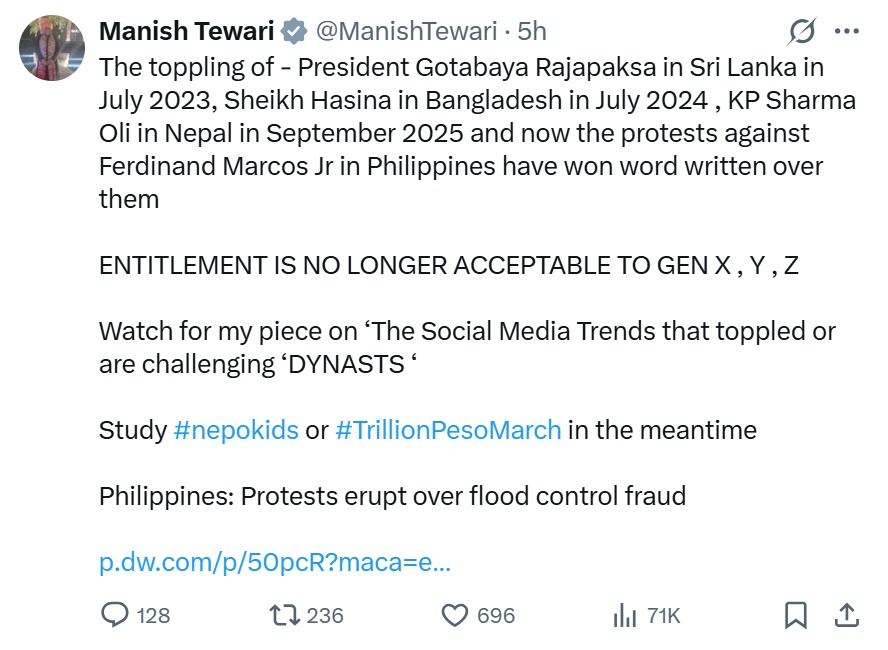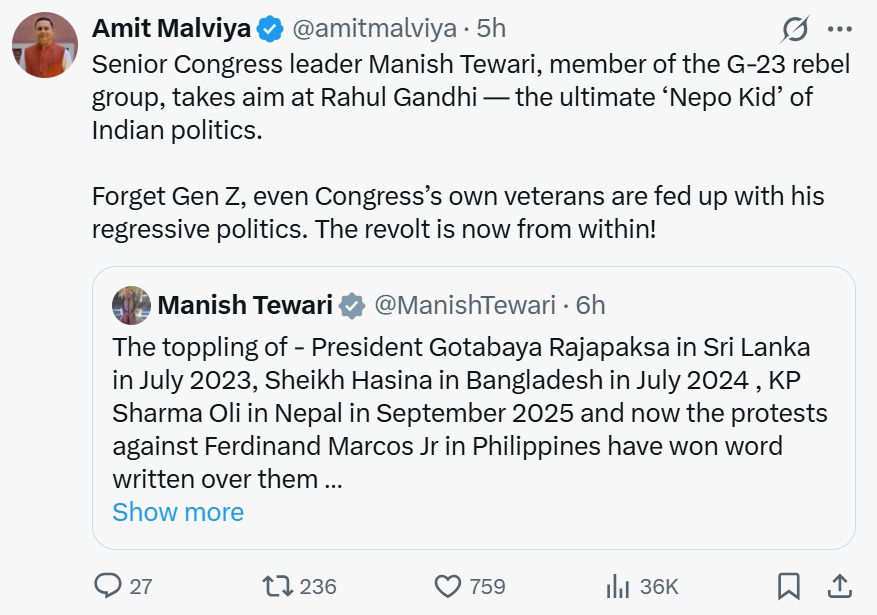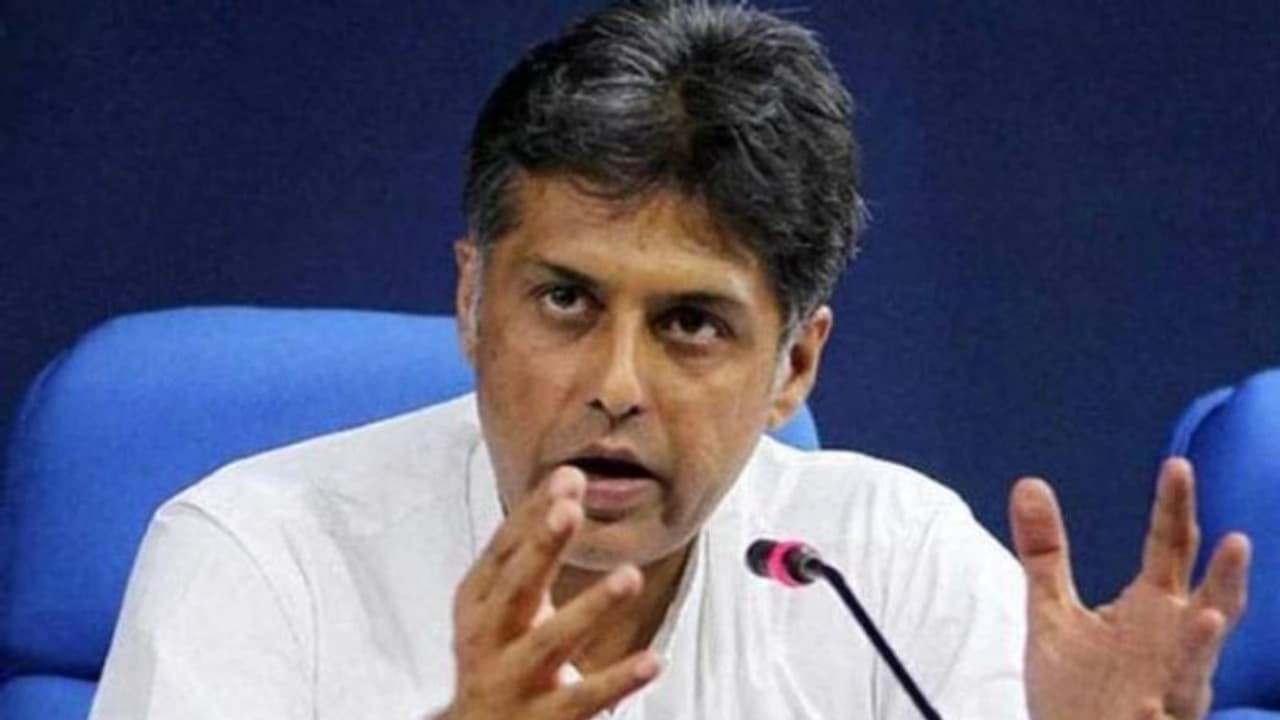Congress MP Manish Tewari’s remarks on regime changes in Asia triggered a row after the BJP linked them to Rahul Gandhi. Tewari rejected the claim, stressing his focus was on global rejection of dynastic politics, not internal Congress-BJP battles.
Senior Congress leader Manish Tewari on Tuesday sparked a major political row with his social media comments on recent regime changes in South and East Asia – Nepal, Bangladesh and Sri Lanka. The BJP has claimed that his remarks were aimed at Rahul Gandhi, while Tewari firmly denied this, saying not everything needs to be reduced to a Congress-BJP fight.
Tewari’s comments on regime changes in Asia
Manish Tewari shared a report about mass protests in the Philippines against alleged corruption in flood control projects. Linking it with wider regional trends, he said the removal of leaders such as Gotabaya Rajapaksa in Sri Lanka (July 2023), Sheikh Hasina in Bangladesh (July 2024), KP Sharma Oli in Nepal (September 2025), and ongoing protests against Ferdinand Marcos Jr in the Philippines, highlight one thing – “entitlement is no longer acceptable to Gen X, Y, Z.”

He added that these movements show how younger generations, empowered by social media, are rejecting dynastic politics and corruption. Tewari hinted that he would soon publish a detailed piece titled ‘The Social Media Trends that Toppled or are Challenging Dynasts.’
BJP links remarks to Rahul Gandhi
The BJP was quick to seize on Tewari’s post. Party IT cell chief Amit Malviya claimed the Congress MP’s comments were an indirect attack on Rahul Gandhi, calling him the ‘ultimate Nepo Kid of Indian politics’. Malviya posted on X that even Congress veterans seemed ‘fed up with Gandhi’s regressive politics’.

Tewari dismisses BJP’s claims
Manish Tewari strongly rejected the BJP’s attempts to link his post to Rahul Gandhi. Responding to Amit Malviya, he said, “Gosh, I just wish some people would grow up in life. Everything does not have to be dumbed down to a Congress-BJP slugfest.”
He stressed that his comments were about political trends in Asia and their national security implications, not about domestic party politics. Tewari said it was important to study why such movements were happening and what lessons India should learn from them.
Scroll to load tweet…
Timing adds fuel to controversy
The controversy comes just days after Rahul Gandhi praised India’s Gen Z and students for defending the Constitution and preventing ‘vote chori’. The timing of Tewari’s post, coinciding with youth-led protests in Nepal, gave the BJP an opportunity to link the two.
The BJP accused Gandhi of attempting to provoke unrest in India. The Congress, however, has not officially reacted to Tewari’s remarks or the BJP’s accusations.
Congress’s outspoken leader Manish Tewari
Manish Tewari has long been known as one of the most outspoken members of the Congress. A former Union Minister and sitting MP from Anandpur Sahib, he was also a part of the G-23 group of senior leaders who, in 2020, demanded internal reforms and stronger leadership in the party.
He was recently in the spotlight after being excluded from speaking in Parliament during the debate on Operation Sindoor, despite having travelled abroad as part of India’s delegation to highlight Pakistan’s role in terrorism. Tewari shared a report of this snub on social media with lyrics from a patriotic song, indirectly signalling his disappointment.
When asked about the cryptic post, he said, “If you don’t understand my silences, you will never understand my words.”
Scroll to load tweet…
Tewari’s stand has often been viewed as critical of the Congress high command. Along with leaders like Shashi Tharoor, Kapil Sibal, and Ghulam Nabi Azad, he has repeatedly called for greater accountability and organisational changes.
The G-23 letter in 2020 came after Rahul Gandhi’s defeat in Amethi and repeated electoral setbacks for the party. These leaders wanted internal elections and stronger leadership to revive Congress’s national presence.
